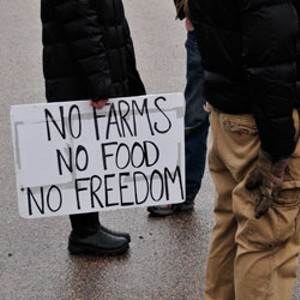Published December 1, 2010 at 10:26 a.m.
Vermont farmers are divided over a food-safety bill voted out of the Senate Tuesday morning that expands the federal Food and Drug Administration’s power to regulate food producers.
Some see the FDA Food Safety Modernization Act as a necessary step toward protecting consumers from the food-borne outbreaks that have sickened thousands in recent years. Others view it as Big Brother-style government intrusion on their freedom to farm.
On the Sunday before the vote, two dozen local opponents of the bill gathered at a Middlesex park-and-ride to protest the legislation. The location was chosen for its proximity to the home of Sen. Patrick Leahy, who supported the bill. Sen. Bernie Sanders also voted for it.
Jason Farina, co-owner of Crystal Spring Farm in Strafford, was among the demonstrators. He fears being shut down by emboldened federal food inspectors when he begins producing raw, unpasteurized honey next year. Elsewhere in the country, federal authorities have seized raw cheese in the name of consumer safety, and Farina worries the new law increases the likelihood the same thing could happen to him.
“I have to wonder if they’re going to come raid my farm with guns drawn,” said Farina. The stocky, bearded Vermonter spoke against a backdrop of homemade protest signs scrawled with slogans such as “USDA — Don’t Touch Our Junk” and “Local Food Is Homeland Security.”
Known as S.510, the food-safety bill would expand the FDA’s authority to regulate food producers with the goal of preventing the illnesses caused by spinach, peanut butter and eggs tainted with E. coli and salmonella. The legislation would increase the frequency of inspections, tighten record-keeping requirements, extend more oversight to certain farms and mandate product recalls if producers fail to conduct them voluntarily.
Vermont has suffered fewer food-borne-illness outbreaks than more populous states, but it hasn’t avoided them altogether. From 2007 to 2009, 13 Vermonters got sick from eating salmonella-tainted peanut butter, cereal and Veggie Booty snack food. Tomatoes, jalapeños and serrano peppers have also been tainted, according to reports compiled by the U.S. Senate’s Democratic Policy Committee.
The original bill was much more draconian than what Sanders and Leahy approved on Tuesday in a 73-25 vote. In September, Sen. Jon Tester (D-Mont.) introduced an amendment that exempts from regulation those farms — like Farina’s — that sell direct to consumers and make less than $500,000 a year.
But that hasn’t reassured Farina and other small-scale growers who think farmers — not the government — should worry about food safety. “If I have a problem with the eggs I’m selling, I’ll hear about it in 24 hours and I can take corrective action,” said Farina.
Debate over S.510 has been rife with misinformation and myths. Claims that the bill would outlaw backyard gardening and seed saving, among other activities, have proliferated on the Internet since the bill was first introduced in 2009.
Will Robb, a board member of Burlington’s Intervale Community Farm, said he attended Sunday’s demonstration because the legislation leaves too many questions unanswered. For instance, what happens if multifarm CSAs team up to supply fresh local food to hospitals or public school systems? That could easily push them over $500,000 in sales a year, Robb said, subjecting small farms to cumbersome record keeping and inspections.
NOFA-VT, the state chapter of the Northeast Organic Farming Association, is backing the food-safety overhaul because, in the words of policy adviser David Rogers, “the alternative is a hell of a lot worse.” The FDA already has expanded oversight of food safety, thanks to the Bioterrorism Act of 2002, Rogers said. What the Food Safety Modernization Act would do is put some constraints on that power, he argued, by “forcing it to pay more attention to small farms and small producers.”
“Knee-jerk antigovernment types are carrying the water for very large agricultural interests because they are opposed to this bill,” said Rogers. “Big ag did not want the Tester amendment, because it exempts small farms and processors. That puts [big ag] at a disadvantage.”
The 800-plus member-farmers that make up the advocacy group Rural Vermont are divided on the food-safety bill, executive director Jared Carter said. However, Rural Vermont as an organization officially supported the legislation with the Tester amendment, Carter said.
Carter noted that 96 percent of Vermont farms fit the bill’s definition of a “small farm” and are therefore exempt from oversight. He acknowledged that food-borne outbreaks are a serious matter but said most cases are coming from industrial-scale farms, slaughterhouses and producers — not the smaller farms doing business in Vermont. Echoing Farina’s comments, Carter said the best quality control is knowing the farmer who sells you milk, eggs and produce.
“If you walk up to a Vermont farm, you can look at it and see what kind of operation it is,” he said.
Raw milk and cheese are of particular concern to opponents of the food-safety act. In 2009, the Vermont legislature passed added protections for producers of raw dairy products, which are considered higher risk because they aren’t pasteurized. S.510 doesn’t explicitly restrict the sale of raw milk, but it does direct the FDA to review existing regulatory “hazard analysis” and “preventive control” programs.
Last summer, an organic-food market in Venice, Calif., called Rawesome Foods was raided by weapon-wielding federal and state inspectors who confiscated unmarked jugs of raw cow and goat’s milk and unpasteurized goat cheese. Also, the U.S. Department of Health and Human Services, as part of its Healthy People 2020 plan, has called for increasing the number of states that prohibit the sale of distribution of unpasteurized dairy products.
Sharon Zecchinelli, who raises pigs, sheep, chickens and rabbits for meat on her farm in Enosburg Falls, sees the Rawesome raid as a cautionary tale about what the Food Safety Modernization Act could unleash on Vermont farmers.
“They mean to kill raw milk in general,” Zecchinelli said at the Middlesex rally.
Rural Vermont’s Carter said such fears are overblown, arguing that most raw-dairy producers wouldn’t come under the new regulations. Vermont law already limits how much raw milk a farmer can sell: 40 gallons a day. Based on the average sale price of $6 a gallon, a farmer selling the maximum allowable volume of raw milk would only bring in around $87,000 a year, Carter noted — well under the $500,000 trigger for federal oversight.
From the Senate, the bill now goes back to the House for final passage before it heads to the White House, where President Obama is expected to sign it into law. If and when it become law, NOFA-VT’s David Rogers predicted, “The devil will be in the details” when the FDA begins writing the food-safety regulations.
“We’ve got several years of hard work paying attention to what the FDA is going to propose in terms of implementing this bill, so it’s like a ‘stay tuned’ kind of a thing,” Rogers said. “It’s like, what did Woody Allen say? Eighty percent of success is showing up? We’ve just gotta keep showing up.”
More By This Author
Speaking of...
-

Vermont Awarded $62 Million in Federal Solar Incentives
Apr 22, 2024 -

Man Charged With Arson at Bernie Sanders' Burlington Office
Apr 7, 2024 -

Police Search for Man Who Set Fire at Sen. Bernie Sanders' Burlington Office
Apr 5, 2024 -

Bernie Sanders Sits Down With 'Seven Days' to Talk About Aging Vermont
Apr 3, 2024 -

Q&A: Howard Fisher Delivers Meals on Wheels With a Side of Good Cheer
Dec 20, 2023 - More »
Comments
Comments are closed.
From 2014-2020, Seven Days allowed readers to comment on all stories posted on our website. While we've appreciated the suggestions and insights, right now Seven Days is prioritizing our core mission — producing high-quality, responsible local journalism — over moderating online debates between readers.
To criticize, correct or praise our reporting, please send us a letter to the editor or send us a tip. We’ll check it out and report the results.
Online comments may return when we have better tech tools for managing them. Thanks for reading.














































